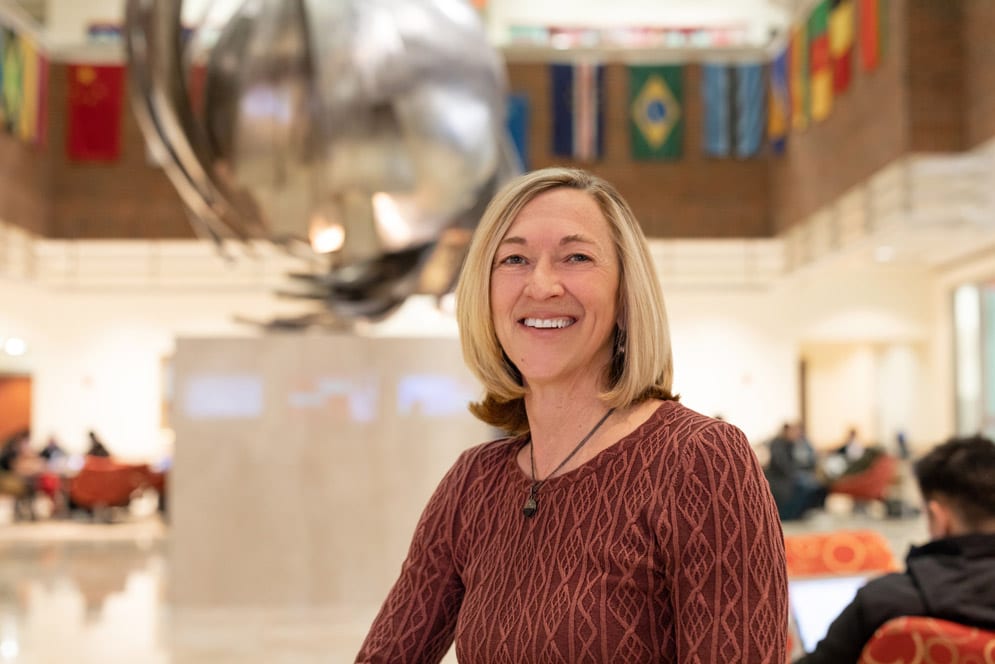The Big Payback: The Highest Paying Jobs for MBAs

Even in 2019, the search for the right MBA program is as unique as each student, and the reasons for applying are as varied as the programs themselves. Advancement in an existing career is an obvious motivation, as is breaking into a new industry or shifting one’s career focus.
One thing that all MBAs can likely agree with, however, is that earning potential is a leading incentive. This brings up questions about the most lucrative fields. Choosing the right concentration can be the first step toward achieving a position that will truly pay off. The following is a look at the current highest paying jobs for MBAs, as well as the majors that can open the necessary doors.
The Highest Paying Jobs for MBAs

Topping the list of the highest paid professions for MBAs in 2018 is strategic management. This specialization leads the way in terms of early to mid career salary, with salary averages beginning at around $125,000. Professionals with this degree and concentration earned $148,000 at the mid-point of their careers. Among the career functions for MBAs with a strategy focus are management consultant, senior strategy manager, senior product manager. Google, Amazon, PwC, and Intel are among the companies hiring for strategic management based positions.

Second on the list of highest paying MBA careers is technology management, which for many grows out of a background in IT or software development. According to Monster.com, tech management careers can start at around $113,000 per year, and advancement leads to a jump to upwards of $165,000. Roles such as senior project manager, vice president of IT, and IT director all emerge from a tech background. Companies such as Accenture, Deloitte, Cisco Systems, and HP all offer leading starting salaries in the IT management field.

Entrepreneurship also falls into the top three earning fields for MBAs. Starting salaries, according to data gathered from PayScale, hover around $100,000 per year, and reach up to around $135,000. Such roles as senior project manager and management consultant are options in the entrepreneurial field, as are various leadership roles in the growing fintech industry. Top hiring companies for entrepreneurship MBAs, according to PayScale, are Amazon, IBM, General Electric, and the Boeing Company.

A career in finance is the fourth of the highest paying categories for MBAs, with a starting salary hovering in the $100,000 range. Those with their sights upon chief financial officer, portfolio management, or financial management positions can hope to land jobs in this arena with high earning power. New York Life Insurance, Fidelity Investments, and Vanguard are currently seeking MBAs for various finance positions.

Along with strategy, tech management, entrepreneurship, and finance, marketing ranks among the most lucrative fields for MBAs. While some marketing jobs do not require an MBA, one can see a wider, more profitable range of options with a specialized study in marketing. Upper level marketing positions can start at around $80,000 per year, and can grow well above $120,000. Current listings for MBAs with a marketing focus include Dell, Microsoft, and, of course, Amazon.
Check Out These New MBA Jobs at Top Food Companies

Soft drinks and coffee and cereal —oh my? When it comes to these products, American can’t get enough. More than $75 billion of soda is purchased every year, with multinational corporations leading the way in supplying goods to meet the worlds’ demands. Continue reading…
Kellogg On Pharma’s Lack of Innovation, and More – Chicago News

Let’s explore some of the most interesting stories that have emerged from Chicago business schools this week.
Everyone Wants Pharmaceutical Breakthroughs. What Drives Drug Companies to Pursue Them? – Kellogg Insights
Northwestern University Kellogg School of Management Professor of Finance Dimitris Papanikolaou recently co-authored new research that illuminates why “pharmaceutical firms these days often make minor changes to existing medications instead of delivering innovative drugs.”
The study, which was co-authored with HBS’s Joshua Krieger and MIT Sloan’s Danielle Li, found that “financial frictions may be limiting innovation.”
According to the article, “The researchers found that firms were eager to work on novel drugs—under the right financial circumstances. When pharmaceutical companies got a windfall, such as a sudden increase in profits, they were more likely to spend it on developing novel drugs than on incremental improvements.”
You can read more about the trio’s research here.
Kadiani Finds Passion for Social Entrepreneurship at Gies Business – Gies College of Business News
The University of Illinois Gies College of Business recently profiled current Master of Accountancy Science student Hamed Kadiani whose social entrepreneurship journey began as part of student organization Illinois Enactus, which helped him understand his desire to see “what the root of the problem is, and then develop a solution that fixes the cause, not the symptom.”
Kadiani later served as project manager for Project Oasis, an “online center that connects immigrants to resources in Champaign-Urbana, provides access to 75 resources in six main focus areas such as healthcare and education, [and] teaches immigrants financial literacy and entrepreneurial skills.”
According to the interview, Kadiani plans to become a CPA but shared his ambitions to some day run for political office.
“I hope I made an impact on campus, but I truly believe this work made more of an impact on me. I am who I am today because of this university and Gies College of Business.”
You can read more from the Gies College of Business News profile here.
Mendoza’s Marketing Major Puts a Strong Emphasis on Digital Skills – Mendoza Ideas & News
Notre Dame Mendoza’s Marketing Department recently recruited Professor Timothy Bohling, who will teaching Digital Marketing to both undergraduate and graduates in spring 2019.
Having previously held senior executive leadership positions at Stratasys, HCL Technologies, and IBM, Bohling’s research and teaching interests are “centered both on scholarly rigor and practitioner relevance in areas of digital marketing, customer relationship management, decision modeling, customer lifetime value and innovation adoption.”

The Mendoza Marketing Department has introduced four specialized tracks that emphasize data-based strategies: marketing decision analytics, brandscaping; consulting and market development; and digital marketing.
You can read more about Bohling, his research, and the 2019 courses here.
Election Day: What Schools are Saying

It’s election day in the U.S., so for our international readers: whoops! Let’s check out some of the day’s big stories coming out of U.S. schools.
Engineered Electioneering – Kellogg Insight
“When it comes to persuading voters, the timing of a candidate’s message may be as important as the message itself,” Kellogg Insight explains.
The overall conclusion of how to approach election messaging comes from new research by Angela Y. Lee, Professor of Marketing at the Kellogg School of Management. With Concordia University of Montréal Assistant Professor Hakkyun Kim and University of Minnesota Professor Akshay R. Rao, the trio’s research finds surprising details that former U.S. President Barack Obama successfully utilized in 2008.
In short, the group’s research finds that voters are more responsive to grander, large-scale ideas the further the election is away. However, as Election Day draws closer, more concrete ideas take precedent.
“[Obama] was emphasizing abstract themes and capturing the imagination of caucus goers, while his opponents were capturing the attention of the D.C. establishment, who then spent a fair amount of time dissecting and critiquing their various plans to fix health care, get out of Iraq, and what have you,” Rao says of Obama’s 2008 campaign.

Northwestern Kellogg research finds that sweeping campaign messaging is more effective when Election Day is further away; a campaign tactic utilized heavily by Barack Obama in 2008.
The trio note that this approach goes beyond politics. In fact, they argue, the methods can be utilized successfully by marketing in other industries.
Insights from the study, Lee notes, may help consumer goods marketers develop more persuasive messages and may also help public health officials design more effective campaigns against such health threats as obesity and smoking. For example, she says, messages that urge people to lose weight or quit smoking as an immediate goal should provide concrete information on how the objective can be achieved.
You can find out more about the research here.
Even a Few Bots Can Shift Public Opinion in Big Ways – The Conversation
As the political landscape rapidly shifts in the U.S. and elsewhere, the internet bot game becomes increasingly important. In The Conversation, Tauhid Zaman, Associate Professor of Operations Management, MIT Sloan School of Management analyzes just how much of an impact these elements may have on Election Day.
His research found that bots had a much smaller presence than others may have speculated: “less than 1 percent of the active Twitter users.”
In addition, Zaman’s work, with his students net another surprising result: Twitter bots helped Hillary Clinton in 2016 more than Donald Trump.
The reason for this, Zaman concludes, is that the effectiveness is not due to the volume, but rather how much individual bots perform. The research finds that there were more Trump-supporting bots in ’16, however, Clinton bots tweeted more on average. He does, however, note that the research only gives a small window into the potential impact bots have.
It’s worth noting that our analysis looked at a relatively small number of users, especially when compared to the voting population. And it was only during a relatively short period of time around a specific event in the campaign. Therefore, they don’t suggest anything about the overall election results. But they do show the potential effect bots can have on people’s opinions.
Click here to read more about Taman’s work.
The Election Just Ahead – The Harvard Gazette
Harvard staff writer Christina Pazzanese, in her newest piece for The Harvard Gazette, details the relative uncertainty of what may happen on Election Day this year. “With polling often inaccurate in the last election, no one can confidently predict what the results will be this time, despite any evident trend lines going in,” she writes.
The focus of her piece lies on three principle elements: youth turnout; hacking; and ideology. On youth turnout, Pazzanese immediately notes that youth demographics have the worst statistical rates of turnout cycle after cycle in the U.S. With infused commitment to voter registration at the Boston university, turnout could reach a record high. However, like Pazzanese says, polling can be “often inaccurate.”
If results from a new Harvard Institute of Politics (IOP) Youth Poll are accurate, turnout among Harvard students could reach a high. Forty percent of voters age 18‒29 say they will definitely vote in the midterm, according to the findings released Oct. 29. Though poll director John Della Volpe said the organizers don’t expect that many to turn out, past trends indicate that, even accounting for the usual gap of -7.5 points between those who say they will vote and those who actually do, the figure suggests young voters will turn out in significantly greater numbers than in many years past. The only midterms in which young voters turned out at a greater rate than their typical 18‒20 percent were in 1986 and 1994, he said.
In regards to voter ideology, Pazzanese paints a more ambiguous outlook.
“Amid such rapid change, political analysts and practitioners have struggled to keep pace, especially since 2016 showed how off-track most had gotten. Many hoping to understand how voters think and behave now recognize that polling and opinion data aren’t delivering a rich enough portrait of where the electorate is moving ideologically, and why.”
Tackling ideology movement in 2018 is endearingly challenging, but left-leaning political data service Catalist, co-founded by current CEO Laura Quinn, a visiting fellow at the Ash Center for Democratic Governance and Innovation at HKS, may have a new approach. The company organized voters into less-than-traditional groups, by approaching potential voters in a different manner.
“So instead of asking questions about expected topics like the Affordable Care Act or gun ownership, which cause people to self-sort into partisan groups, Catalist asks about things that don’t signal an obvious right or left response, but gets at someone’s values. These are queries like ‘Is it morally good or bad to leave a dog out in the rain, or for a soldier to refuse to obey a potentially illegal order from commanders?'” Pazzanese writes. The results are as follows:

Quinn notes the grouping is not a total encapsulation of the electorate, however. “None of these things perfectly explains why people are the way they are. People are complicated, and they change. It’s the constellation of things that you believe that give you a sense of the person.”
You can read more about election day from The Harvard Gazette here.
Meet Boston Questrom’s First Female Dean, Susan Fournier

What does it take to be the first female dean at your business school? It takes a lot of experience, know-how, and pioneering research. That’s precisely why Boston University’s Questrom School of Business choose Susan Fournier to be the first female to lead the school. After 13 years as a marketing and management professor at BU and as a leading international expert on brand marketing, she was an obvious choice.
“She brings a remarkable tool kit of experience and knowledge to this role—and a genuine connection to the students, faculty, and staff, who are the heart of Questrom,” Jean Morrison, BU Provost and Chief Academic Officer, told BU Today. “I am excited to welcome her to this role and to follow her success as she guides Questrom to continued excellence as a leading global business school.”
Meet Susan Fournier

Susan Fournier, Questrom Professor in Management, will become the new dean of the Questrom School of Business, effective August 27. Fournier is an international expert in brand marketing / Photo by Dan Watkins
Dean Fournier is well known at Boston University and in the field of marketing. She’s credited with pioneering brand relationships; a marketing field that explores the emotional relationships between consumers and brands. Fournier has written two acclaimed books on branding as well as participating in numerous best-selling Harvard case studies. Most recently, Fournier’s soon-to-be-published paper examines the pitfalls of celebrity-based branding, focusing on Martha Stewart’s 14-year career.
Fournier’s research has received several awards including the JRC Long-Term Contribution Award from the Association for Consumer Research as well as Emerald Publishing’s Citation of Excellence Award for the top 50 articles in management. Other awards include being ranked among the Top 10 percent of authors on SSRN regarding all-time downloads. She also claims over 20,000 Google Scholar citations with five works garnering over 1,000 citations each.
On her new role, Fournier sees a strong correlation between research specialties and her position as dean. They’re both about relationships.
“I have deep knowledge in the psychology and sociology of relationships, how they develop, how they fall apart, what kind of flavors they come in,” she says. “The whole point of what I do is looking at why people connect with things, what role brands, products, organizations have for people in their lives. It’s not about selling a product, it’s about understanding people’s lives … and trying to help them.”
Beyond her research, Fournier is a celebrated professor with over 24 years of experience in academia covering the gambit from teaching undergraduate courses to teaching in MBA and Executive classrooms at such prestigious schools as Harvard Business School, Dartmouth College’s Tuck School of Business, and Questrom.
Before her new role as Dean, Fournier served as the Senior Associate Dean of Faculty & Research and Faculty Director of the Questrom MBA and Doctoral programs. During that time, she hired 22 tenure-track research faculty and 18 non-tenure track faculty across disciplines and departments.
Outside of academia, Fournier worked as a market research consultant for companies such as Polaroid Corp., Altria, IBM, Coca-Cola, and Chick-fil-A, according to the Boston Globe.
What To Expect
“I will be the champion of the Questrom School of Business brand,” Fournier tells BU Today. “I will be looking out to make sure all the decisions we make are on brand and are going to build our equity as a preeminent academic institution, from every person we hire to every course we develop to every institute we endow.”
Fournier has many exciting plans for Questrom. Not only will she work to increase interdisciplinary programming, but she’ll also ensure Questrom’s financial security and aligning coursework with student and employer needs. And her work has already begun breaking down outmoded silos in favor of interdisciplinary programming. She has helped eliminate boundaries in hiring, interfaces, and education in general.
“I’m trying to further establish our reputation as a preeminent research and teaching institution and develop our reputation for research that matters and faculty who care,” Fournier says. “We need strong partnerships with industry and organizations both to provide data for research that matters but also to be in partnership with us in the development of courses and projects that students would work on for hands-on learning. I have a stakeholder perspective from having worked and lived on the other side.”
Also, Fournier plans to focus on online and experiential learning, global partnerships, and practical and pragmatic research particularly in focus areas such as health, social impact, and digital technology. She sees these areas of the economy as important spaces to “double down” by hiring more faculty, building research institutes, and implementing new programs and concentrations.
Fournier told The Daily Free Press that she also plans to build more partnerships between faculty and research tracks in those areas. “We already have what I would consider to be a fantastic culture, but let’s further enable the collaborative culture, and in particular … interdisciplinary work and ideas and projects and partnerships,” she says.
High Expectations
As for what the Questrom School can expect its new dean? It’s an exciting time for the school, and University President Robert A. Brown gives her his enthusiastic support.
“Susan assumes the role of the dean of the Questrom School of Business during an exciting time for the school, for business education, and the University,” Brown told BU Today. “I look forward to working with her to continue the journey of increasing the quality and impact of the school’s education and research programs.”
And Fournier is excited as well, not just about being the first female dean at Questrom, but about being a great dean in general.
“We’ve never had a woman dean, and it’s definitely notable and wonderful,” Fournier told The Daily Free Press. “But I also would say that at the same time, I want to be known as a great dean, not first and foremost as a woman who happened to get a dean role. I’m really looking forward to the day when that doesn’t even have to be a question anymore.”
Find the original school press release about the Susan Fournier appointment here.
New MBA Jobs: PWC, Berkshire Hathaway, Credit Suisse, and More!

MBAs can always look forward to plenty of hot job opportunities once they graduate. Here’s a look at some of this week’s best new MBA jobs at respected firms like PWC, Berkshire Hathaway, Credit Suisse, Jane Street, and Chevron. Learn more about these open positions and apply today! Continue reading…
